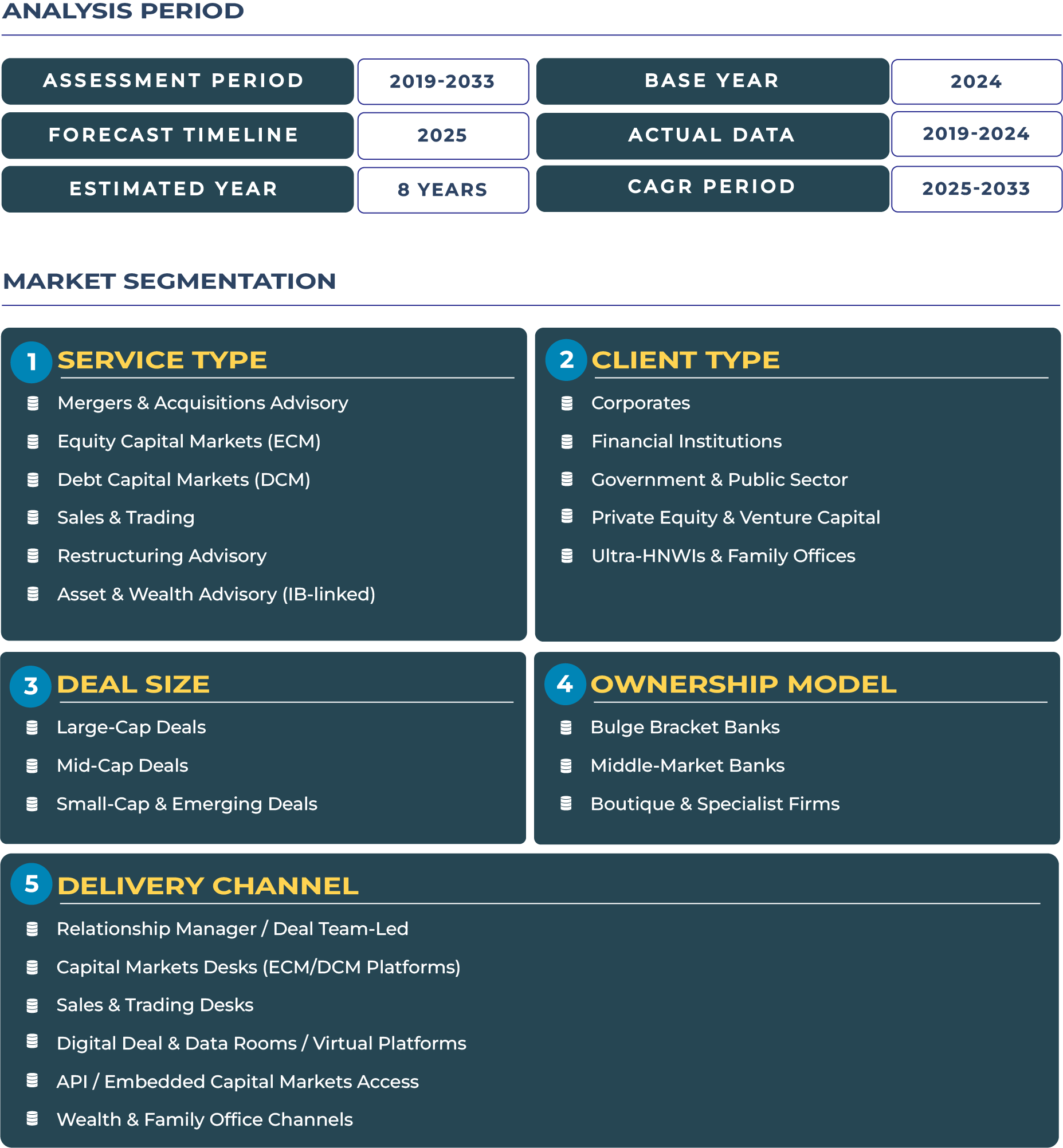Sustainable Finance and Cross-Border Advisory Defining the Future of Nordics Investment Banking
The Nordics has emerged as one of the most progressive regions in the global investment banking landscape, driven by its strong commitment to sustainability, digital transformation, and cross-border advisory services. As financial institutions in Sweden, Norway, Denmark, Finland, and Iceland align with evolving environmental policies and responsible financing models, the region continues to attract investments from corporates, institutional clients, and international funds. Advisory functions around renewable energy, green bond structuring, and ESG-linked mergers have positioned Nordic investment banks as strategic partners in the global transition to cleaner financial ecosystems. As of 2025, the Nordics Investment Banking Market is valued at USD 5.4 Billion, projected to reach USD 7.2 Billion by 2033, growing at a CAGR of 3.6% due to rising demand for sustainable finance, digital financial products, and cross-border capital market activities. Despite global economic headwinds, geopolitical uncertainties, and market fragmentation, the region maintains strong investor confidence through structured regulatory frameworks and financial stability.
Note:* The market size refers to the total revenue generated by banks through interest income, non-interest income, and other ancillary sources.
Nordics Investment Banking Market Outlook: ESG Capital Markets and Advisory Accelerating Nordic Deal Pipelines
Renewable energy investments, corporate decarbonization mandates, and high investor appetite for sustainable capital markets are actively shaping the Nordics Investment Banking sector. Financial institutions are advising on offshore wind, hydrogen, and green technology funding, supported by policy frameworks and climate targets set by authorities such as the Nordic Council. The market forecast from USD 5.4 Billion in 2025 to USD 7.2 Billion by 2033 highlights the continued integration of ESG and digitalized dealmaking in the region. The increasing number of public-private partnerships and cross-border deals ensures resilience amid fluctuating macroeconomic conditions. Capital placements for clean energy, green bond issuances, restructuring mandates, and niche merger and acquisition transactions are expanding advisory revenues. The region’s strong pension fund ecosystem and sophisticated corporate governance models continue to attract asset managers and foreign investors seeking environmental and socially responsible instruments.
Drivers & Restraints Influencing Nordic Investment Banking Dynamics
One of the most significant growth accelerators in the Nordics Investment Banking Market is the dominance of sustainable finance. Corporates in sectors such as energy, logistics, and industrial technology are turning to advisory banks for ESG-linked debt, sustainability bonds, and green merger and acquisition advisory. Government incentives and investor expectations around environmental disclosures have further increased transaction volumes. The region’s established regulatory environment enables seamless structuring of cross-border deals, particularly in green capital instruments, private placements, and public share offerings.
However, constraints remain. Domestic markets in Scandinavian countries are relatively small in comparison to major European hubs, limiting the scale of IPOs and large-cap deals. Although Norway and Denmark attract considerable investor interest, smaller economies like Iceland and Finland face limitations in domestic liquidity and corporate depth. Macroeconomic risks in Europe, fluctuating interest rates, and regulatory reporting standards occasionally slow down deal finalizations. Competition from Frankfurt, London, and Paris continues to challenge the region’s global market share, putting pressure on investment banks to differentiate through digital platforms and sustainability-oriented advisory services.
Trends & Opportunities Shaping Strategic Advisory and Capital Market Innovation
A growing trend in the Nordics is the rapid adoption of fintech-enabled advisory models and digital capital market tools. Financial institutions are collaborating with technology firms to introduce algorithmic bond issuance solutions, cross-border trading platforms, and automated restructuring advisory. ESG compliance platforms and data-driven investment insights are helping bankers tailor products for asset managers, SMEs, and large corporates. The increasing flow of capital into offshore wind projects, hydrogen development, and circular economy initiatives is expanding the demand for long-term financing instruments, syndicated loans, and alternative investment structuring.
Opportunities for investment banks in the region extend beyond sustainability alone. Renewable energy financing is driving large-scale advisory requirements for asset divestitures, greenfield project financing, and refinancing of legacy energy infrastructure. The growing prominence of green securitizations, sustainability-linked credit facilities, and ESG-focused private equity placements also presents lucrative deal-making potential. Expansions into cross-border advisory for European and North American investors are expected to increase transaction volumes, particularly for mid-market corporate acquisitions and joint ventures in the renewable and digital sectors.
Competitive Landscape: Nordic Players Scaling ESG and Energy-Centric Advisory Offerings
The Nordics Investment Banking Market is led by banks with strong sustainability credentials and international capabilities. Regional institutions such as Nordea, Danske Bank, SEB, and DNB are expanding advisory portfolios around renewable projects, decarbonization strategies, green bond structuring, and syndicated loans. International banks leverage partnerships to enter high-potential sectors such as offshore wind, digital finance, and infrastructure investments. Strategic moves like sustainability-driven merger and acquisition portfolios and financing programs reinforce market competitiveness. The continued emphasis on ESG financing, innovation consultancy, and regional corporate restructuring supports long-term revenue pipelines. Capital market firms are increasingly partnering with fintech players to streamline cross-border trading and analytics-driven deal execution, sustaining the region’s financial leadership.







